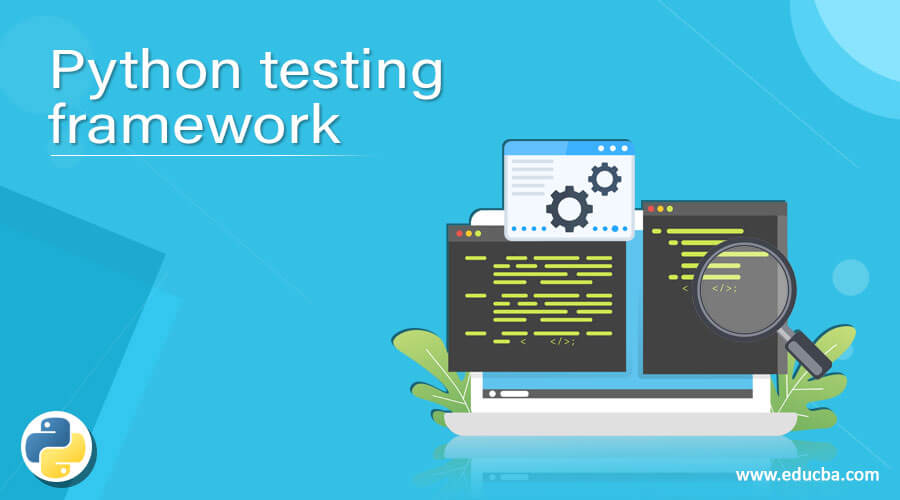Updated April 19, 2023

Introduction to Python Testing framework
Python was first published in 1991 to provide a simple, clear, human-readable, elegant, and less overcrowded language of programming for the job. And in testing, such qualities are a must, particularly if you have manual testers who do not necessarily have programming skills in a team who are now transitioning to automation and can easily use Python’s fast-training curve. There are a number of reasons why Python is increasingly common in the field of test automation and why it is considered one of the best test automation options. The Zen of Python is both object-focused and functional for beginners, it has a rich package library, a large worldwide community, and a lot more. In this topic, we are going to learn about the Python testing framework.
Frameworks of Python testing
Let’s have a look at Python Testing Frameworks
1. TestProject
TestProject is a 100% FREE full cloud reporting automation platform. With Python Open Source SDK, test automation can also be easily built for mobile, web or generic use using TestProject. It supports both Python and Unittest frames, version 3.6 or higher. TestProject contains all of the required dependencies in the running of the single platform agent. Single Agent executable that contains all 3rd party libraries required for mobile, web, and generic testing test automation. The agent will conduct tests one time, so you can use Docker Agents for parallel testing.
2. PyUnit
PyUnit (Unittest) is an inspired JUnit unit testing application for Python. It is the default Python test frame that comes from the Python package box and the one from which most developing companies start testing. There is no need to install any extra modules since it is part of the standard Python library – it comes with the Python kit from the box. Often the purpose of the test code is uncertain as it supports abstraction. A lot of boilerplate code is appropriate.
3. Robot Framework (RF)
Robot Platform (RF) is a framework for open-source testing automation, test development (ATDD) acceptance, and automation of robotic processes (RPA). Its center is in Python, but Jython (Java Python implementation) and IronPython can also be implemented (Python for .NET framework). You must either version 2.7.14 or higher of Python to execute it. Based on keyword testing (KDT), it is also possible to easily build test cases with human-readable keywords that parallel testing is not supported but can be done by using the Selenium Grid or by using Pabot.
4. Pytest
Pytest is an open-source test frame that can be used in the most popular Python test frameworks. In addition, Pytest supports unit testing, functional testing, and API testing. You need version 3.5 or higher of Python to run it. Is extensible with plugins, including pytest-Django, pytest-cov, and pytest-bdd. Compatibility is not the secret to Pytest, because while you can easily write test cases with Pytest, because of using Pytest’s special routines, you would not be able to use them with any other testing system.
5. Nose2
Nose2 is a Nose successor and is primarily PyUnit (Unittest), but plug-in based. Nose2 expands the PyUnit over and beyond its features by using many plugins that provide support for testing, parameters, decorators, test discovery, fixtures, etc. As the PyUnit (Unittest) framework extends out of the Python library box, it is simple to get started. There is a lack of detailed documentation that can prevent you from starting.
6. Lettuce Framework
It is an easy-to-use behavior-driven automation tool, which is very popular for BDD testing. The python and cucumber are based. It simplifies and makes the BDD approach entertaining. Python Package Manager or Pip, Python, or any IDE such as the Pycharm or other, are needed. Python 2.7.14 or any of the above versions.
7. Jasmine Framework
Jasmine is a BDD framework. Jasmine is a BDD framework. It supports test automation both of Python and of Ruby and JavaScript. The server-client unit testing is mixed. You must run karma tests in order to run Jasmine. It supports asynchronous and asynchronous test cases without DOMs. More stress than technical information on applications of business significance.
8. Gauge framework
Gauge is a flawless instrument built out of the same Selenium team. As Gauge is a system of open source, there are several different ways to use it. Gauge is one of the best choices if you want to incorporate continuous testing in the CI/CD pipeline. Thanks to their cross-browser testing features, Gauge now gains a lot of impetus.
Recommended Articles
This is a guide to Python testing framework. Here we discuss how great Python is for automation testing, but also how easy it is to test Python. You may also have a look at the following articles to learn more –

